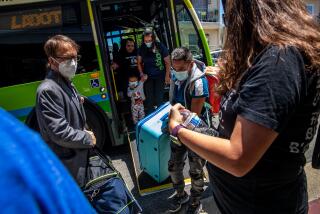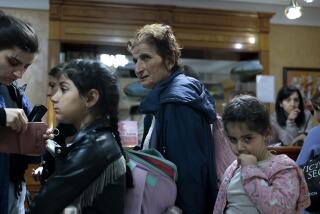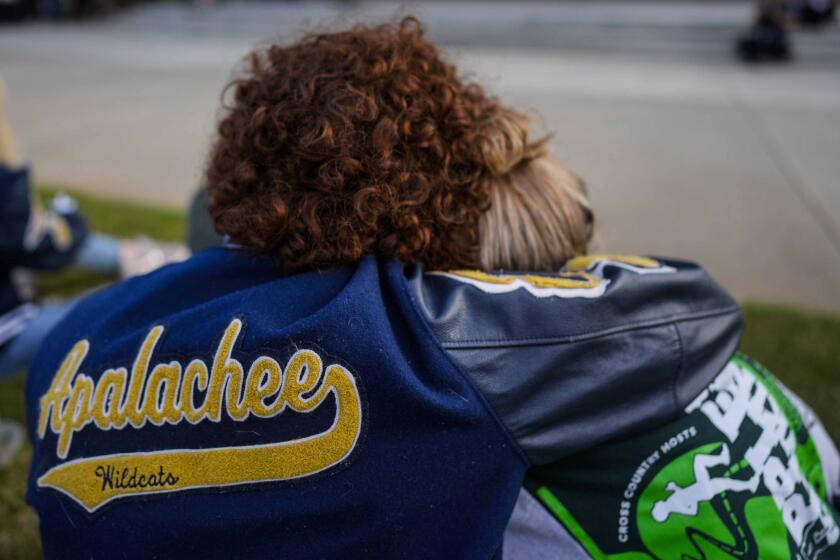Mass Repatriation of Kurds Under Way : Iraq: Allied troops load refugees onto trucks and buses. Authorities believe 200,000 have already returned on their own.
SILOPI, Turkey — Allied troops loaded Kurdish refugees onto trucks and buses Saturday, beginning a mass repatriation, and authorities said about 200,000 Kurds have already returned to northern Iraq on their own.
The figure for returnees is far higher than previous estimates by relief organizers. Earlier this week, officials said 50,000 Kurds had gone back.
Also Saturday, an Iraqi general met a Kurdish rebel leader on a stretch of no-man’s land in the first face-to-face talks between the two sides on the future of the provincial capital of Dahuk.
And another Kurdish rebel leader met with President Saddam Hussein to discuss an autonomous homeland for the Kurds in northern Iraq. The official Iraqi News Agency gave no details.
In another development, the head of the U.N. relief effort, Prince Sadruddin Aga Khan, said the U.N. plans to expand its humanitarian operations in northern Iraq. He spoke in Turkey after touring several refugee camps.
Saturday marked the start of the full-scale allied repatriation effort announced last week, dubbed Operation Gallant Provider.
At a way station in Kanimasi in northern Iraq, the allies began operating a fleet of rented trucks. British Royal Marines Maj. Damian McKinney said the goal is to move 7,000 refugees a day.
But by midafternoon, only 1,200 refugees had come down from the mountains, McKinney said, fewer than in recent days. Many refugees said they are still afraid to go home.
Also, the U.S. military had hired 200 trucks to transport refugees, but only 28 arrived at Kanimasi. U.S. officials said later that the 200 vehicles would be spread among a series of way stations.
The effort aims to bring most of the approximately 260,000 refugees still in camps on the Turkish border to their country within a month. Despite the snags, the allies affirmed their commitment to helping the refugees get home.
“If necessary, they will carry children and the weak on their backs,” Royal Marines Maj. Gen. Robin Ross said in a statement from his headquarters.
The refugees fled to the mountains to escape feared retribution from Saddam Hussein’s forces after the failed Kurdish uprising in the wake of the Persian Gulf War.
The allies have carved out a protected zone in northern Iraq for the refugees, but it does not include Dahuk, which is still occupied by the Iraqis. Dahuk natives are believed to make up at least half the more than 450,000 Iraqis who fled.
The allies have moved to the outskirts of Dahuk but have not moved to occupy the city.
On Saturday, Iraqi Brig. Gen. Nushwan Danoun met with Fadhail Merani, leader of the rebel Kurdish Democratic Party, to discuss some sort of compromise status for the city. It was “a first step toward peace and security in Dohuk,” Merani said afterward. But it was unclear whether anything was actually decided.
Allied officials are waiting for an Iraqi response to their idea to make a demilitarized zone out of Dahuk. Iraq and the allies have spent a week seeking a compromise over security in the city.
A spokesman at the relief command at Incirlik Air Base in southern Turkey said officials now believe about 190,000 of the refugees have already drifted back down to the lowland areas protected by U.S., British, French, Dutch and other allied troops.
The figure for returnees is far higher than any other previously provided by relief organizers.
The meeting between Kurdish Democratic Party leader Massoud Barzani and Hussein was their second in a week to work out details of a proposed autonomous homeland for the Kurds.
More to Read
Sign up for Essential California
The most important California stories and recommendations in your inbox every morning.
You may occasionally receive promotional content from the Los Angeles Times.










